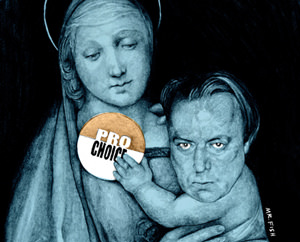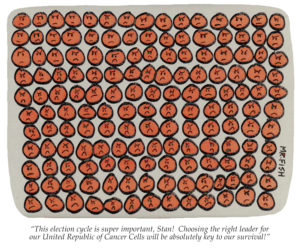For Christopher Hitchens
It was like meeting a clown outside of his makeup, away from the hysteria of his profession, who appears lovely and handsome and noble, if only because he isn’t trapped in a spotlight at the center of a ludicrous pie fight. It was like meeting a clown outside of his makeup, who appears lovely and handsome and noble, if only because he isn’t trapped in a spotlight at the center of a ludicrous pie fight.
Another version of this piece ran in the LA Weekly in 2007.
He appeared equally capable of pissing into your grandmother’s fish tank as beating you at chess; the Angus Young of quasi-omniscient political journo-intellectualism, looking as if he had been assembled hastily by sausage makers hoping to fill a suit with all the succulent impropriety of vitriolic meats made sane by delectability. Well aware that the shortest distance between birth and death is a very straight line, his reputation was that of a man prone to the rich experiences offered by staggering. And, contrary to the caricature so lavishly and lovingly rendered by friends and foes alike that painted him as either a reliable guard or attack dog, one with a ferocious mouth that showed no mercy, Christopher Hitchens was not a wild animal, much to both my relief and dismay.
It was like meeting a clown outside of his makeup, away from the hysteria of his profession, who appears lovely and handsome and noble, if only because he isn’t trapped in a spotlight at the center of a ludicrous pie fight.
In fact, having recently won the 2007 National Magazine Award for “Columns and Commentary” for his outstanding work for Vanity Fair, not to mention the surprising popularity of his then-new book, “God Is Not Great: How Religion Poisons Everything,” which reached No. 4 on Amazon’s best-seller list even before its official release date, there was something both cheerful and elegant and, dare I say, sober about Hitchens when I met him at dusk sitting alone on a squat sofa in the posh outside reception area of his Beverly Hills hotel. In his rumpled trademark suit the color of Caucasian neutrality, a camouflage for anything but, he had just arrived in town to do the 2007 Los Angeles Times Festival of Books, which I would see him do 16 hours after interviewing him and, much to the shock of everybody in attendance and in sharp contradiction to the outstanding premise of his book of there being no deistic magic in the universe, he performed the jaw-dropping miracle of receiving more applause and admiration than anybody else on his panel, the equivalent of walking on whiskey at a venue that typically booed him. One felt that the air he drew through his ever-present Rothmans Blue cigarette while he walked from the crowded ballroom to the signing area afterward was the lightest it had been in quite a long while. It was amazing. Christopher Hitchens, crucified more times by old friends and new enemies than all the velvetized Jesuses in Tijuana combined, had been born again.
“M. Poisson,” he said when we first met, in response to my gregarious hello, using the French version of the name that I attach to the bottom of my cartoons.
“Sir Hitchens,” I said, resisting the temptation to make a joke to myself about what rose-colored version of doomsday he must have been seeing through the rose-colored retinas I was all too happy to notice, his roguish reputation gleefully revealed to be picture perfect.
He stood, we shook hands. “Do you want to get a drink from the bar before you sit down?” he asked, making me feel like the guest and him the host in my own hometown.
“Sure,” I said, looking at the coffee table separating us both and seeing a pack of cigarettes, a cup of espresso and a wine glass the size of an inverted bell jar containing just enough red wine — a dead Jesus, we used to call it — to tease a postage stamp.
“Do get the Coppola,” he insisted, a name that I was unable to recall 90 seconds later while standing at the hotel bar, having not made the connection to the famous film director’s winery. Had the connection been made, it would have most certainly turned me off, as I had lost my taste for any celebrity-named foodstuff in the summer of ’75 when I ate enough Bobby Clarke Peanut Butter to caulk a chimney. Instead, I asked the bartender for a glass of cabernet that had a name I’d have a hard time spelling, that didn’t sound too much like an Italian sports car or a brand of designer jeans or something that a moneyed Napa Valley hippie might find delightfully sardonic — no Barefoot wine, nor Mad Housewife. His choice cost me 18 bucks, whatever the fuck it was.
“Did you get the Coppola?” Hitchens wanted to know when I returned.
“Yes,” I said, setting my gigantic glass of whatthefuck down and turning on my tape recorder.
MR. FISH: Let’s talk about the title of your new book first, “God Is Not Great: How Religion Poisons Everything.” There’s nothing obtuse about it, is there? In fact, I can’t imagine anybody buying the book and then being offended because they didn’t know what they were getting.
CHRISTOPHER HITCHENS: No, which is the point. A lot of people have been waiting for something like this for a long time, this push back to religious bullying and stupidity. The title came to me in the shower, which is where most of my ideas come to me. That’s why I’m so clean.
Do you care that such a blatant title might limit its readership to mostly those who need no convincing of your argument? Is it really going to change anybody’s mind?
I do think it will change minds, precisely that.
Why do you think so?
Because I think there are a lot of minds that are not so much in a solid form of dogma. The book isn’t just about saying to hell with you and your foolish faith. I think it’s probably useful to have at least some knowledge of the other side, empathy even.Can a person be spiritual without being religious?
I suppose so. Everybody, whether they’re laying a brick wall with a trowel or shearing a sheep, has experienced the transcendent, that’s one thing. It’s quite another to believe that the universe is directed towards you. The holy texts do actually say what they say and they do mandate a lot of incredible stupidity. I’m rather proud of the chapter [I wrote] about Dr. King. Many people, at least ostensibly, have been motivated to do grand, good things by faith, but why is that necessary? You don’t need the supernatural to be in favor of abolishing the condition of slavery, for instance, whereas you do need the Bible to keep slavery going so long. Subjectively, do I really know whether Dr. King was a believer or not? I don’t. Did he actually think that the story of the Exodus was true? If so, he contradicted it at every turn because he did not promise black Americans that they could kill everyone who disagreed with them.
It could be argued that the threat to humanity posed by religion pales in comparison to the threat posed by science and technology — napalm didn’t come out of the Vatican, it came out of the chemistry department of Harvard University. One could feasibly make the point that at least God doesn’t require 30 billion barrels of oil a year to keep his halo glowing.
No, but then if you look at what could be very frightening you would have scientific knowledge plagiarized by unscientific people who have contempt for both science and reason. That’s now been made possible by our global internationalized civilization. Surely, to most people, that’s the most scary thought; in combination is apocalyptic technique in the hands of messianic forces. Let’s be honest about it, there is an advantage to the rational mind as opposed to the fanatical one — the fanatical one is not very good at science and, so far, this advantage has played out in our favor.
Still, does science bear no responsibility when they create, essentially, a doomsday machine and then say it should only be used for peaceful purposes?
I would think it was a bad thing if the species was destroyed by an apocalyptic weapon, but I can’t see how any religious believer would think it was such a bad thing. To them it’s not a tragedy, it can’t be. They’ve repeatedly said so. And, sure, a secular power with a nuclear weapon could make the mistake [of ending the world] and several times nearly has. Nothing stops that. The idea that we could die as a species is obviously very high. The fact that we’ve survived this very brief time is rather surprising. It would be ironic if it were something that arose from our intelligence that got rid of us.
Maybe intelligence is the wrong word.
Well, we’ve been used to that ever since nuclear physics was discovered. This kind of thing seems to be common sense, our tenure on this planet is very fragile — goddamn. By the way, in my view, in case I didn’t make this clear enough in the book — which, actually, I think I didn’t — outgrowing the supernatural and the superstitious is not sufficient for emancipating the human race. It’s only the beginning. All our big discoveries and big arguments are ahead of us, but the one that has to be subtracted is the fanatical one that prays for the end of time.
Most of the religious people I know are not religious because they’re adhering to some ancient, antiquated text or because they’re afraid of spending eternity burning in hell if they misbehave. Do you think that religion, for some people, simply fulfills the same purpose that fiction and literature might for you or I, [as a way to quantify] ideas of right and wrong?
That’s why I say, in many ways, that [the question of religious inquiry] is a literary question; it’s about ethics and the origin of ethics and the best way in which they’re expressed is a dilemma — ethical dilemmas are in literature and myth, yeah, sure. The difference is that I can step outside of it and as soon as you can see it from the outside you can see that it’s man-made. Being man-made isn’t the worst thing. It’s just you can’t then make it into a transcendent law that everyone must obey. And that’s what I object to and that’s what has to stop.
There’s a basic question that I seldom see included in this discussion and that is the question of the viability of human consciousness itself, and whether or not it perceives reality or just perceives itself perceiving reality. In other words, can consciousness even perceive the truth or does it only interpret a version of the truth relative to a person’s mood, opinion, ideology, [et cetera]?
No school of philosophy has ever solved this question of whether being determines consciousness or the other way around. It may be a false antithesis. Here’s what I do know, those who claim that they do know this are bound to be wrong. The argument is not equal between us and the supernaturalists. They don’t just claim to know there is a supernatural that can be miraculous as a designer, they don’t just claim to know that, which is more than they can know. No one can know that. I admit that I can’t. They say, ‘No, no you can! Not only that, you can know God’s mind. Not only that, you can know what he wants you to do about food and sex.’ If we start by excluding those who say there’s no point in the argument, who say they already know the truth, if we drop them then we may get some progress. Then we’re left with an argument among grown-ups.
Do you find that an argument against the existence of God is not unlike an argument against the existence of obscenity? Or, how about this — this is the equation: There’s a difference between a cent and a penny. The cent is the imaginary value of the penny, it isn’t real, yet when we see the penny we see the cent because we’ve made them interchangeable. The cent is what we react to, but [we] have to believe it exists first.
I think I know what you’re saying — go on.
We’ve developed this habit of using the incontrovertibility of physical reality to give incontrovertibility to our imaginations, therefore, we’re capable of making our imaginations seem real, so God can seem real. You can see it when you look at the words “cunt” and “vagina.” Both words refer to the same exact thing, yet one is considered obscene. The difference between the words cunt and vagina is imaginary.
I know what you mean. However, cunt is a hate word.
But it was invented to be such.
It’s true that obscenity is a matter of taste and in the eye of the beholder. The real objection to obscenity, in my opinion, is the result of our makeup, specifically that the urinary/genitry/excretory is mixed up. That’s what makes children laugh and whistle and grin. If that were not the case, we’d be a lot better off, perhaps. Obscenity comes from grime. “Free education is a gift to the poor, it raises them out of the gutter. It teaches the girls to write cock on the door and the boys to write cunt on the shutter.” It’s the relationship between the spiritual and urinary, that’s where obscenity comes from.That’s my point, is obscenity — or God — something we can even have a rational conversation about if we’ve only been conditioned to react to it? Is consciousness an evolutionary flaw?
That’s what I say in my first quotation in the book.
“Oh, wearisome condition of humanity Born under one law, to another bound; Vanity begot, and yet forbidden vanity, Created sick, commanded to be sound.” — Fulke Greville, “Mustapha”
The situation is we’re mammals, we leak and we excrete and then we’re told to forget about that or to deny it. Religion is totalitarian because it demands the impossible. [Like religion], obscenity shuts you down. The secular argument, or the liberal argument, is to, as much as possible, remove taboos so things do not become unmentionable; to let some air into the discussion. I’m old now — I remember when D.H. Lawrence’s “Lady Chatterley” was banned because the government thought that once you ban the book you can get people to stop thinking about these things. And I remember thinking that’s a mistake, a very obvious mistake. You probably increase the chances of [people] thinking about these things.
Which reminds me of my favorite Lenny Bruce quote.
What’s that?
Knowledge of syphilis is not instruction to get it.
[Chuckles] It was easy to argue this kind of thing in the ’60s, against censorship, against bans on homosexuality, et cetera. Now you do run into people who say, then why would you forbid pedophilia? Would the same standards hold for this? Or snuff movies? Or third trimester abortions? This argument takes place among rationalists and humanists and sociologists. We don’t say that if you allow [these things] we would be comfortable with obscenity. I do think there are lots of things you don’t have to be taught. Most people don’t have to be taught not to eat dead human beings, let alone to kill them in order to eat them. You don’t have to drill this into children. You don’t have to drill it into children that if one of their parents wants to go to bed with them that they should go and stay at the neighbor’s for the night, you don’t have to. You could say that that’s an argument for a creator with a benevolent view but then you’d have a huge rational argument about why we are programmed to kill and torture and so on. It does show that morality precedes religion, that ethics precedes religion, not the other way around.
Still, I wonder if our survival as a species is something we can will given a consciousness that is able to make its imagination seem real?
We can’t stand far enough outside of our dilemma to think it completely through. It’s like the mind/body distinction. There may not be a distinction. The mind is clever enough to consider the distinction, but it’s not clever enough to get far enough outside the body to arbitrate it.
And that’s the rub.
We don’t know that we’re not dreaming. Look, we can’t resolve these things today. Here’s what I insist on: Those who say they know are out of the argument and should be treated with less respect. We are having, even here in this lobby with the traffic, here in L.A., we’re already having quite a high-level discussion, about things that are fairly imponderable to combat, up against a phalanx of people who say what’s the point in having this discussion? We already know the answer. What’s the point of struggling and arguing and researching? This is what I find hateful.
Some people might accuse you of asking everybody to be comfortable living in a godless universe that is completely indifferent to them. How do you imagine people will go about satisfying their own sense of purpose?
Obviously, it’s not possible for people to do that all of the time, but it is possible for them not to draw any conclusions from their belief that the universe is all about them. If a huge rusted fridge fell through the ceiling and obliterated you without warning, I would think well, that was lucky. Presuming that the fridge was directed at neither of us, it’s not lucky at all. But I would not be human if I didn’t think it was a bit of luck. This is why religion can’t be beaten, because it does derive from all these forms of selfishness, self-centeredness, fantasy and so on. Fine, I concede to that, but then why do people keep saying that I have to respect it? I don’t have to respect any belief, nor do you, that a rusted fridge that killed you and didn’t kill me was a piece of luck. You do not have to respect that. You can recognize it and see where it comes from. You can analyze it, you can even sympathize with it. You can’t really say that I insist also that you respect it.
There is in religion, however, some practical application. Take, for instance, the very radical notion that the meek have some intrinsic value. African-Americans, just to take an obvious example, were told for centuries that they were something much less than human, so for them to have access to a Bible that tells them that they are significant, that white society doesn’t determine their worth, is, well, significant. For them it was a belief system that acknowledged, and still does in large part, that they were human beings that were being mistreated. Respecting that aspect of religion doesn’t demand that you also kowtow to superstition.
Of course, of course, I see what you’re saying. Since there’s no justice in this world, there better be some justice on offer in the next. Again, you can see where it comes from, fine. It’s the same when Karen Armstrong [author of “The Great Transformation: The Beginning of Our Religious Traditions”] writes about Islam. Arabs were being teased by Jews and Christians, “You haven’t had a prophet yet.” Well, they were going to get one, weren’t they? Then you have the Archangel Gabriel appear to some fucking peasant merchant who can’t read, exactly borrowed from the [Judeo-Christian] faith. Yes, of course I understand that, but it’s too much to ask me to believe it. It’s too much to ask me to respect it. It’s too much like I would be, too much like myself. I can’t respect something that follows my own wish fulfillment. I don’t. The last time I prayed was for an erection. Don’t ask me if I got it or not — who cares?
Having had just enough Sunday school to know the story of Lot’s wife and how to recognize an unhealthy temptation when I heard one, I struggled hard to keep my eyes above c-level and asked Hitchens a final question about whose existence was easier to disprove, Henry Kissinger’s or God’s. He laughed and said that it was the same process for eviscerating each high-profile Jew in print and that, essentially, the quantitative differences between nonexistent entities was not measurable, being the difference between the hole in a very old bagel and the hole in a relatively recent one.
When he stood to say goodbye three hours after we began our conversation, I did not stand to shake his hand, not because I was trying to be disrespectful, but rather because I figured a greater disrespect might have been expressed had I fallen down on him. I was drunk. Waiting until I was sure he was a safe distance away, I stood slowly, stacking my vertebrae like hermit crabs beneath a bowling bowl, and zigzagged outside and took a moment to look up at the stars and to recall something that Mark Twain had said: “Go to heaven for the climate, hell for the company.” “And back and forth,” I thought to myself, amending the sentiment, “if you have any interest in learning anything about anything.”
Four years later, on the morning of Dec. 16, 2011, I poured myself a glass of red wine and went to the window and toasted the same stars that, although I couldn’t see them, I knew were still there.
Your support matters…Independent journalism is under threat and overshadowed by heavily funded mainstream media.
You can help level the playing field. Become a member.
Your tax-deductible contribution keeps us digging beneath the headlines to give you thought-provoking, investigative reporting and analysis that unearths what's really happening- without compromise.
Give today to support our courageous, independent journalists.






You need to be a supporter to comment.
There are currently no responses to this article.
Be the first to respond.